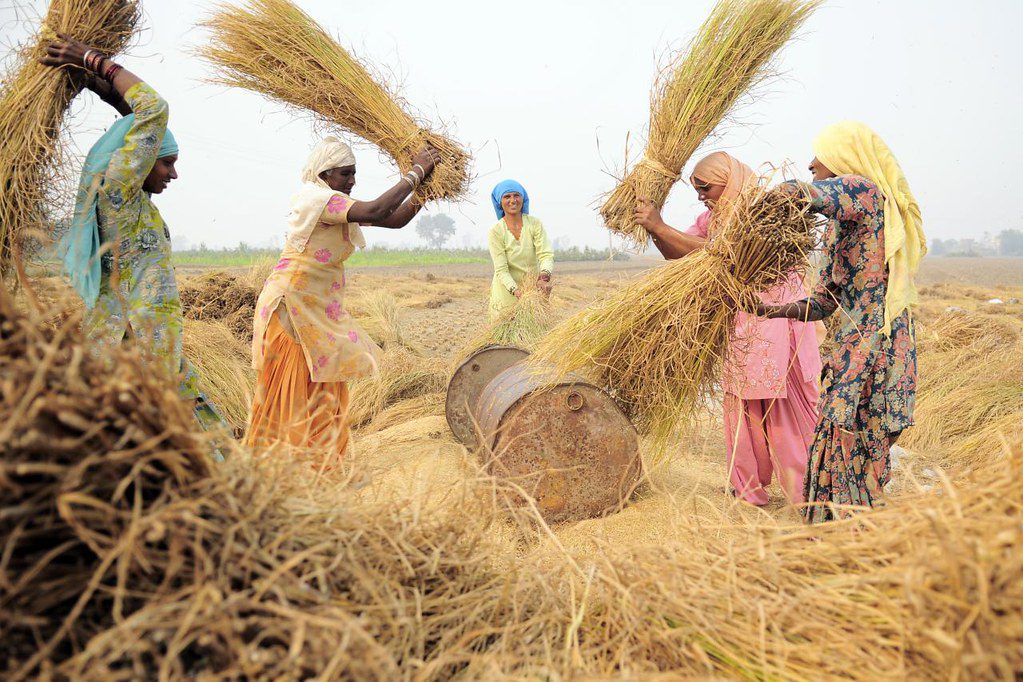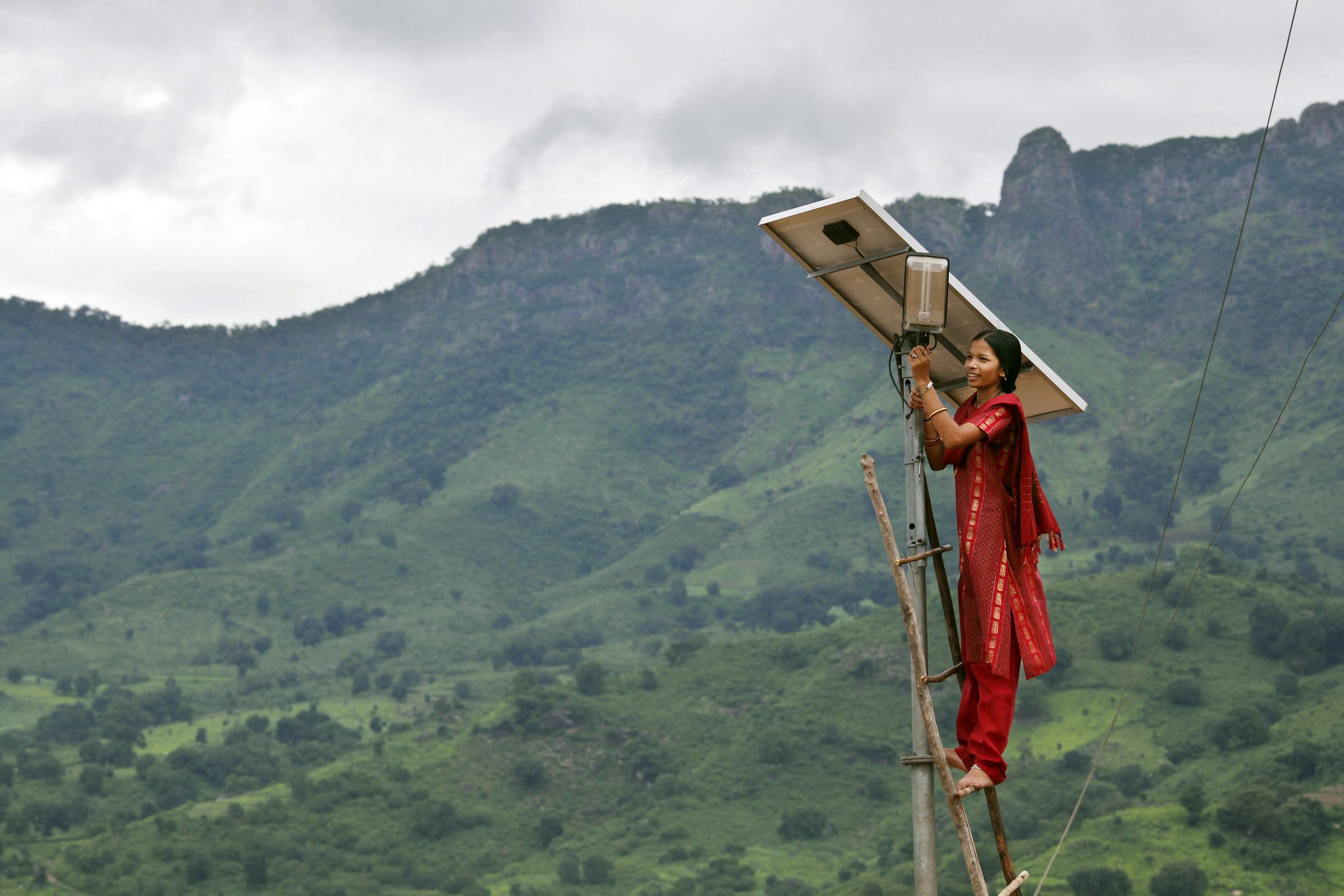The Mittal Institute at Harvard University recently held its inaugural Climate Change Workshop in New Delhi to kick off a new Climate Platform for South Asia. Reema Nanavaty, Director of the Self Employed Women’s Association (SEWA), delivered a keynote that highlighted the climate challenges faced by working poor women in South Asia. The full transcript of her talk follows.
Keynote speaker Reema Nanavaty of the Self Employed Women’s Association (SEWA).
Climate Change Workshop: Reema Nanavaty’s Keynote Address
“Namaste. A very good evening and a very good morning, and I can see that we are in the Boston and Delhi times together. So to the distinguished delegates present here, sisters and brothers. I feel like challenging the previous panel and the speakers, but I’ll stick to my own talk. And because I think it is my immense pleasure to speak here, not as an individual, but on behalf of our 2.5 million women workers or poor women of SEWA in India, across the 18 states. Some million members also in the neighboring countries of South Asia, such as Afghanistan, Pakistan, Nepal, Sri Lanka, and Bhutan.
Having been working for over five decades organizing the informal sector, women workers, some lessons that emerge which I thought would be really very important when we are all discussing the ways forward for climate change and adaptation and mitigation, which I’d like to share. As our late founder, Ela Bhatt always said, and I would really like to reiterate it today, that poverty is a form of violence with the consent of the society. She also said that adverse impact of changing climate has more to do with us than the nature. The climate crisis, therefore, if not addressed with the participation of poor, and especially poor women and workers, it will take the form of violence that exacerbates poverty.
The climate crisis, therefore, if not addressed with the participation of poor, and especially poor women and workers, it will take the form of violence that exacerbates poverty.
I would also again, keeping the previous speakers in mind want to say that poor do not want charity, they don’t want subsidies. It’s the rich entrepreneurs the rich companies that want charity or subsidies. What the poor need is an enabling environment so that poor can turn every adversity into an opportunity for development as they want and when they want. This is possible. When poor women workers are organized, have built their collective organized strength that helps them negotiate at worse it is almost always with gentleness. For poor women, innovation is their survival or coping strategy. It’s not a luxury for them. Their daily work, they need continuously to innovate their skills, their tools, their functions and use of research. Therefore, there is need to include the poor and women in the climate adaptation and mitigation process. They are already doing so. We need to only leverage with needed time, money and know how, what the poor are doing.
Let me allow me to share some concrete examples that support the lessons that I just shared with you. There’s limited need for me to spend time in describing the climate crisis. I want to tell you what not hundreds but thousands and millions of poor and women in India and in the neighboring countries are already doing to mitigate the crisis. And how by organizing these women with organizations such as ours, can help put our energy, time, money and know how behind thousands of solutions as they unfold on daily basis.
Heat waves have become unprecedented climate crisis. Last year from late March 2002, the temperature went up many times over 45 degrees. Last year on May 14 the temperature peaked to 52 degrees centigrade in the desert areas of Surendranagar in Gujarat state of India, where over 15,000 salt pan workers live and work for generations. Even for those salt pan workers who bend their back for nine months into the open sky to pump out brine water and farm it to evaporate into salt, this was harsh, oppressive heat. Even they had never experienced anything like this. The salt pan workers therefore got solar powered water cooler, which was installed at the community center. For these salt pan workers, now they fill up the earthen pots for their daily consumption. And as one of the salt pan workers explains, never in our life would we have been able to have a refrigerator of our own. This water cooler is like a collective refrigerator for all of us. It is cool when we cooperate and that’s the lesson.
As we are all gathered here it was raining and the clouds were thundering and while we were discussing climate change and therefore, several states in India are experiencing rising temperatures coupled with unseasonal rains. This is directly impacting the livelihoods of small farmers, agriculture workers, salt pan workers, vendors and waste recyclers, their children and their families are affected. We have been sending weather advisories to these members in several states. How do we salvage the ready harvest, ready to harvest crops in the fields? How much can one salvage of the harvested crops? We need data that is decentralized helps us to be self-reliant in making climate decisions, and is useful to move towards full employment, data that ensures food security at the household level.

Rice threshing, near Sangrur, SE Punjab, India |By Alliance of Biodiversity International.
I would therefore like to say that climate change driven shocks cyclones, floods, heat waves, cold waves are increasingly impacting human lives around the world, but especially in South Asia. And this impact is most severe on the poor in our parts of the region, who do not have the means to deal with these impacts. Poor women are particularly vulnerable, given the endemic social and economic disadvantages they already face. Is climate justice possible without gender justice? No.
Is climate justice possible without gender justice? No.
To work with its members save as listening to the members making their work more visible to the economy and the society and finding ways to accept and acknowledge their work to reduce the climate risk and build resilience and therefore, we need to work on building resilience at three different levels, resilience of the workers, especially the women workers, resilience of the workers organizations, and resilient policies to manage the climate crisis such as the heat waves, the cold waves the unseasonal rains. This needs a longer-term vision and programmatic design. Just the nature of the risk is such that it needs longer term intervention. For long term resilience building to climate shocks ensuring that the livelihood remains stable, there is a need to set up Climate Resilience Fund financial innovations. Will any of the IFCs or the Sequoias be ready to invest in the poor and these poor women’s organizations? Then we don’t need to discuss climate change and building resilience … Unless and until we are including the poor and the women in the whole process.
Some of the adaptations activities also need to focus on access to energy for adaptation strategies, which work at the community level. Early warning against climate shocks is important and it is important that the information reaches the poor and the women first and the fast. There’s urgent need on data collection on post climate impact, on the loss of life and damage of health and loss and damage of livelihoods. Currently, there’s no unlimited data available. This calls for investment in case studies and individual accounts at all levels.

Meenakshi Dewan tends to the solar street lighting in her village of Tinginaput, India | By UK Department of International Development.
We recognize and realize that the worst impact of change in climate is and will be on women and the poor. We do not want to see them as victims. We want to see them in the forefront of building green economy and economy of nurturance. Planting tree should generate more income than cutting trees. While reducing carbon footprint should be more profitable than incerase in carbon footprint. And where economic solutions are derived from ecological solutions. All this is possible when we keep our eyes open to see what these women are doing to widen our prospective on defining what is adaptation and justice, and even our understanding and support to the transformation of life and income sustainability.
In the end I would just like to say that as SEWA was planning to celebrate 50 years of our organizing our founder reminded us that the 50 years have gone by. We need to plan for the coming 50 years. And I am very glad that our members collectively resolved to work towards building cleaner skies. We call them as the Swachh Akash. How do we make our soil clean, our water clean, our air clean and become a cleaner land and green economy?
I’m so glad that several of our partners, the South Asia Institute of the Harvard, the NRDC, they are all joining hands together in making us achieve this. Shall we all together, therefore, sing as our members always say, We Shall overcome, we shall overcome We shall overcome someday Oh, deep in my heart I do believe We shall overcome someday We are still hopeful, we’re still optimistic and we shall not give up. Thank you so much.“
Read more about the Mittal Institute’s climate change research projects on climate change adaptation and mitigation and a climate data-monitoring ecosystem.
